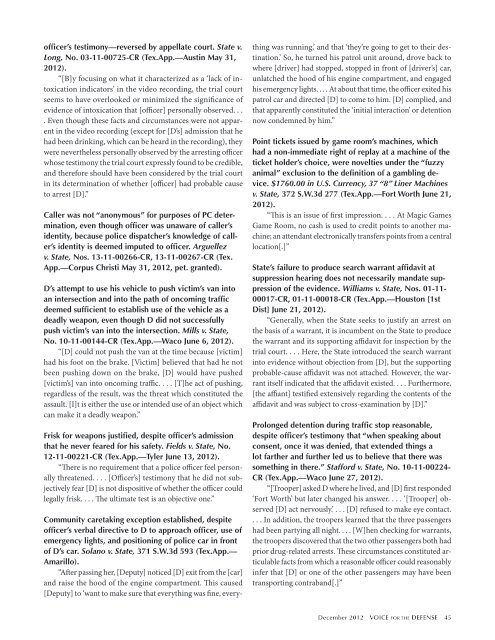tcdla - Voice For The Defense Online
tcdla - Voice For The Defense Online
tcdla - Voice For The Defense Online
You also want an ePaper? Increase the reach of your titles
YUMPU automatically turns print PDFs into web optimized ePapers that Google loves.
officer’s testimony—reversed by appellate court. State v.<br />
Long, No. 03-11-00725-CR (Tex.App.—Austin May 31,<br />
2012).<br />
“[B]y focusing on what it characterized as a ‘lack of intoxication<br />
indicators’ in the video recording, the trial court<br />
seems to have overlooked or minimized the significance of<br />
evidence of intoxication that [officer] personally observed. . .<br />
. Even though these facts and circumstances were not apparent<br />
in the video recording (except for [D’s] admission that he<br />
had been drinking, which can be heard in the recording), they<br />
were nevertheless personally observed by the arresting officer<br />
whose testimony the trial court expressly found to be credible,<br />
and therefore should have been considered by the trial court<br />
in its determination of whether [officer] had probable cause<br />
to arrest [D].”<br />
Caller was not “anonymous” for purposes of PC determination,<br />
even though officer was unaware of caller’s<br />
identity, because police dispatcher’s knowledge of caller’s<br />
identity is deemed imputed to officer. Arguellez<br />
v. State, Nos. 13-11-00266-CR, 13-11-00267-CR (Tex.<br />
App.—Corpus Christi May 31, 2012, pet. granted).<br />
D’s attempt to use his vehicle to push victim’s van into<br />
an intersection and into the path of oncoming traffic<br />
deemed sufficient to establish use of the vehicle as a<br />
deadly weapon, even though D did not successfully<br />
push victim’s van into the intersection. Mills v. State,<br />
No. 10-11-00144-CR (Tex.App.—Waco June 6, 2012).<br />
“[D] could not push the van at the time because [victim]<br />
had his foot on the brake. [Victim] believed that had he not<br />
been pushing down on the brake, [D] would have pushed<br />
[victim’s] van into oncoming traffic. . . . [T]he act of pushing,<br />
regardless of the result, was the threat which constituted the<br />
assault. [I]t is either the use or intended use of an object which<br />
can make it a deadly weapon.”<br />
Frisk for weapons justified, despite officer’s admission<br />
that he never feared for his safety. Fields v. State, No.<br />
12-11-00221-CR (Tex.App.—Tyler June 13, 2012).<br />
“<strong>The</strong>re is no requirement that a police officer feel personally<br />
threatened. . . . [Officer’s] testimony that he did not subjectively<br />
fear [D] is not dispositive of whether the officer could<br />
legally frisk. . . . <strong>The</strong> ultimate test is an objective one.”<br />
Community caretaking exception established, despite<br />
officer’s verbal directive to D to approach officer, use of<br />
emergency lights, and positioning of police car in front<br />
of D’s car. Solano v. State, 371 S.W.3d 593 (Tex.App.—<br />
Amarillo).<br />
“After passing her, [Deputy] noticed [D] exit from the [car]<br />
and raise the hood of the engine compartment. This caused<br />
[Dep uty] to ‘want to make sure that everything was fine, everything<br />
was running,’ and that ‘they’re going to get to their destination.’<br />
So, he turned his patrol unit around, drove back to<br />
where [driver] had stopped, stopped in front of [driver’s] car,<br />
unlatched the hood of his engine compartment, and engaged<br />
his emergency lights. . . . At about that time, the officer exited his<br />
patrol car and directed [D] to come to him. [D] complied, and<br />
that apparently constituted the ‘initial interaction’ or detention<br />
now condemned by him.”<br />
Point tickets issued by game room’s machines, which<br />
had a non-immediate right of replay at a machine of the<br />
ticket holder’s choice, were novelties under the “fuzzy<br />
animal” exclusion to the definition of a gambling device.<br />
$1760.00 in U.S. Currency, 37 “8” Liner Machines<br />
v. State, 372 S.W.3d 277 (Tex.App.—<strong>For</strong>t Worth June 21,<br />
2012).<br />
“This is an issue of first impression. . . . At Magic Games<br />
Game Room, no cash is used to credit points to another machine;<br />
an attendant electronically transfers points from a central<br />
location[.]”<br />
State’s failure to produce search warrant affidavit at<br />
suppression hearing does not necessarily mandate suppression<br />
of the evidence. Williams v. State, Nos. 01-11-<br />
00017-CR, 01-11-00018-CR (Tex.App.—Houston [1st<br />
Dist] June 21, 2012).<br />
“Generally, when the State seeks to justify an arrest on<br />
the basis of a warrant, it is incumbent on the State to produce<br />
the warrant and its supporting affidavit for inspection by the<br />
trial court. . . . Here, the State introduced the search warrant<br />
into evidence without objection from [D], but the supporting<br />
probable-cause affidavit was not attached. However, the warrant<br />
itself indicated that the affidavit existed. . . . Furthermore,<br />
[the affiant] testified extensively regarding the contents of the<br />
affidavit and was subject to cross-examination by [D].”<br />
Prolonged detention during traffic stop reasonable,<br />
despite officer’s testimony that “when speaking about<br />
consent, once it was denied, that extended things a<br />
lot farther and further led us to believe that there was<br />
something in there.” Stafford v. State, No. 10-11-00224-<br />
CR (Tex.App.—Waco June 27, 2012).<br />
“[Trooper] asked D where he lived, and [D] first responded<br />
‘<strong>For</strong>t Worth’ but later changed his answer. . . . ‘[Trooper] observed<br />
[D] act nervously.’ . . . [D] refused to make eye contact.<br />
. . . In addition, the troopers learned that the three passengers<br />
had been partying all night. . . . [W]hen checking for warrants,<br />
the troopers discovered that the two other passengers both had<br />
prior drug-related arrests. <strong>The</strong>se circumstances constituted articulable<br />
facts from which a reasonable officer could reasonably<br />
infer that [D] or one of the other passengers may have been<br />
transporting contraband[.]”

















